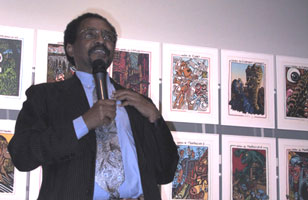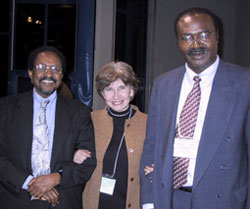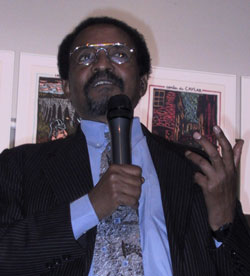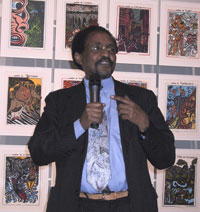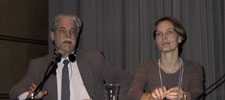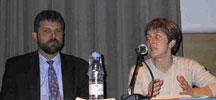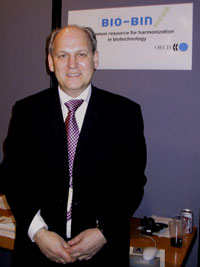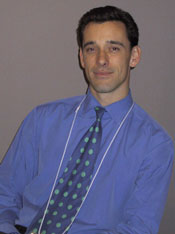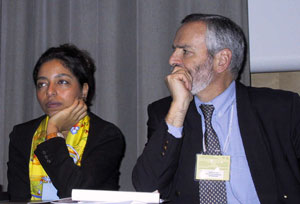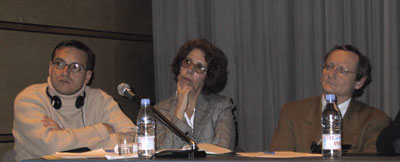 
|
|
|
First Meeting of the Intergovernmental Committee for the Cartegena Protocol (ICCP1) Montpellier,
FRANCE Première Réunion du Comité Intergouvernemental pour le Protocole de Cartegena |
|
|
| Monday
11 | Tuesday 12 | Wednesday
13 | Thursday
14 | Friday 15 | |
|
Réception en l'honneur de Tewolde Berhan Gebre Egziabher Des représentants des délégations du Protocole de Carthagène, du Secrétariat de la CBD, des
|
||||||
|
Séance d'Information sur l'Etiquetage:
Solagral, a French NGO focused on international
regulations on agriculture, environment and development, hosted a morning
side-event about practical, political and scientific issues surrounding
labeling. Panelists included consultant David Hathaway, Brazil;
microbiologist Isabelle Hippolyte CIRAD, Solagral, France; and François
Pythoud, Swiss Delegation; alongside co-chairs Pierre Castella and
Katell Le Goulven, Solagral. David Hathaway noted the who, what, when, where, and
how's of labeling GMO/LMOs. Salient
issues include the need for public knowledge of the presence or
involvement of GMO/LMOs in food production on the basis of making informed
political/religio-spiritual/health decisions about consumption; policy
options for governments in labeling positively (e.g. "this food contains
GMO/LMO products"), negatively (e.g. "this food is GMO/LMO free"),
or ambiguously (e.g. "this food may contain GMO/LMO products"); and
that market forces and public consciousness can expedite policy
development in some cases. Isabelle Hippolyte presented scientific parameters of
testing for GMO presence or involvement in food production: an antibody-antigene
process test producing a chomotographic protein separation which can
easily be compared with control group results from known organisms; and
gene testing through amplification of gene reproduction, which can rely on
comparative quantification of genetic sequencing of unknown and
genetically-related known organisms. Hippolyte noted that science can detect, quantify and analyze the
presence of GMOs in any product and European policies exist which have
quantified thresholds, but science is limited by lack of research and
reference materials in this field, and
difficulty in identifying or quantifying highly diluted GMO levels, or
GMOs in heavily produced products. François
Pythoud, underscored the considerable progress made in
the past two years bringing identification and labeling to the forefont,
however work remains to be done on how to define GMOs. Though there are many details to be ironed out, Pythoud assured
that the existence of the Protocol was indicative of countries' will and
desire to continue discussing these issues. |
||||||
|
Les systèmes d'information de l'UNIDO et de l'OCDE:
Peter Kearns, Environment Directorate - Biotechnology, OECD, presented the BIO-BIN, a joint UNIDO/OECD project and common resource for harmonization in biotechnology. BIO-BIN is a project of cooperation between OECD's BioTrack for OECD Member countries, and UNIDO's BINAS (Biosafety Information Network and Advisory Service) which focuses on UN Member States and non-OECD Member countries; both of which are repositories for information on authorities, commercial releases and field trials of GMOs and documentation related to safety in biotechnology.La source d'information se trouve à http://www.oecd.org/ehs/biobin/.
|
||||||
Plan Stratégique de la SCBD pour 2002/2010: Sam Johnston souligna la nécessité pour la SCBD de développer un Plan Stratégique pour la prochaine décade, insistant sur le processus de datage pour formuler, ébaucher, discuter, réviser et préparer un Plan initial, d'ici l'année prochaine. Les questions soulevées comprenaient la longueur, la différenciation entre le Plan et les PALT, la focalisation principale sur le Plan, l'objectif d'ensemble du Plan et sa relation avec les programmes de travail existants, et le lien qu'il aura avec le Protocole. |
||||||
|
Etiquetage des OVM dans l'Architecture des Normes Internationales: Tewolde Gebre Egzhiaber, Ethiopia, noted that the Protocol provides a basis for effective labeling of LMOs, including commodities, but it is not sufficient on its own. He noted the need for active government involvement to develop labeling standards at the national for contained use and transit as well as in the future under the Protocol for LMO commodities. He also noted that developing countries support labeling of all LMOs, because they have less capacity to deal with emergencies and their environment's are more conducive to the survival of foreign organisms.
Patrice Dauchet, French Ministry of Finance and Industry, reviewed the history of labeling in the EU and ongoing activities under the Codex Alimentarius Commission. Marijane Lisboa, Greenpeace International, highlighted activities at the WTO Ministerial in Seattle related to biotechnology and growing public concern over labeling and environmental and food safety. João Magalhães and Doaa Abdel Motaal, World Trade Organization (WTO), discussed WTO disputes (Thailand vs. Egypt on tuna fish in GM soya oil) and the WTO's Agreements on Technical Barriers to Trade (TBT) and Sanitary and Phytosanitary Measures (SPS) regarding questions of labeling and biotechnology. They also focused on issues of non-discrimination, like products and production and process methods. Stéphane Guéneau, SOLAGRAL, noted the importance of traceability and harmonizing standards, as well as the lack of a conflict resolution mechanism under the Protocol.
|
